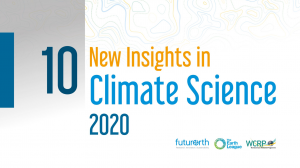
Top 10 insights in climate science in 2020 selected by 57 leading global researchers
Scientists have released a compilation of the 10 most important insights on the climate from the last year to help inform collective action.
In the 10 New Insights in Climate Science 2020 report presented today to Patricia Espinosa, Executive Secretary of the United Nations Framework Convention on Climate Change (UNFCCC), report authors outlined some of 2020's most important findings within the field of climate science, ranging from improved models that reveal the need for aggressive emission cuts in order to meet the Paris Agreement to the growing use of human rights litigation to catalyze climate action.
The report alleviates some worries that the climate system would be more sensitive to carbon dioxide than previously assumed, which were raised as results from the latest climate models were published from 2019 and on, but it also excludes the range of low climate sensitivity. This means that scenarios with low CO2 mitigation are highly unlikely to deliver on the Paris Agreement targets. The report also points out a number of growing risk factors including emissions from permafrost that are currently not considered, concerns about weakening carbon uptake inland ecosystems, and climate change impacts on freshwater and mental health.
“This series is a critical part of our mission to get the latest science to decision makers in an accessible format to help accelerate transitions to sustainability,” says Wendy Broadgate, Future Earth Global Hub Director, Sweden. “Worsening wildfires, intensifying storms, and even the ongoing pandemic are all signals that our relationship with nature is deteriorating, with deadly consequences.”
The 10 New Insights in Climate Science 2020 report was prepared by a consortium of 57 leading researchers from 21 countries. As a partnership of Future Earth, the Earth League, and the World Climate Research Programme (WCRP), the series synthesizes the latest sustainability research for the international science-policy community, with annual installments since 2017.
“To cope with future climate change, we require detailed knowledge about the functioning of the climate system, and actionable information has to be developed about regional to local climate change and its impacts,” says Detlef Stammer, Professor at the University of Hamburg and Joint Scientific Committee Chair of the World Climate Research Programme. “This report provides several examples of important progress in both categories.”
“Given the urgency of reducing greenhouse gas emissions and removing carbon from the atmosphere to keep our planet from overheating, it is critical to inform the decision-making process for immediate action by the newest insights from climate science,” says Peter Schlosser, Vice President and Vice Provost of the Julie Ann Wrigley Global Futures Laboratory at Arizona State University and co-chair of the Earth League.
While this report confirms the continued amplification of key environmental impacts, it also points to opportunities that arise from new insights in climate change economics and governance, and the possibility of using climate litigation. 2021 will be a critical year to act if the world is to achieve the Paris Agreement targets and preserve humanity’s critical climate niche. The estimated investment costs in 2020-2024 to deliver on the Paris Agreement are only estimated to roughly half of the post-pandemic stimulus packages that have been announced so-far.
Jon Walton
Future Earth
Jon.walton@futureearth.org
Visit us on social media:
Facebook
Twitter
LinkedIn
10 New Insights in Climate Science 2020 launch event w/Patricia Espinosa (UNFCCC)
EIN Presswire does not exercise editorial control over third-party content provided, uploaded, published, or distributed by users of EIN Presswire. We are a distributor, not a publisher, of 3rd party content. Such content may contain the views, opinions, statements, offers, and other material of the respective users, suppliers, participants, or authors.


